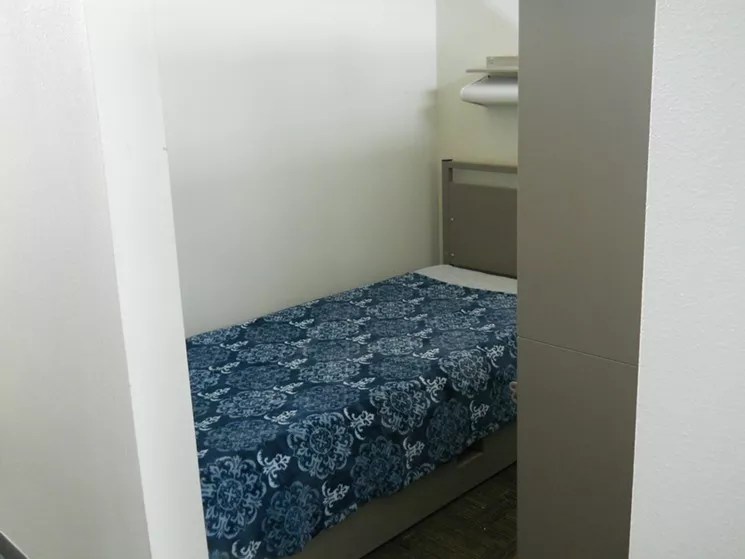
Donatas Dabravolkskas

Audio By Carbonatix
There was a moment this year when The Bridge Homeless Recovery Center, which serves between 8,000 and 9,000 homeless people a year, almost had to shut its doors because of a stupid software problem. Not its software. Somebody else’s.
Although The Bridge had a sophisticated software system, it was paying a crew of temps to pound away on keyboards, entering data manually because the agency to which the data had to be delivered did not have a system capable of receiving it digitally.
City Hall’s reaction at first was to tell The Bridge it would cut off their funding if it didn’t crank out the data faster. That was the door-shutting moment. No money, no services.
Only when Dallas Mayor Mike Rawlings and Dallas County Commissioner John Wiley Price intervened did the city get off its ass and provide The Bridge with the money it needed to keep the doors open. And why? What was the root cause of all this? Do people in Dallas just not care about the homeless?
No. People all over the city work diligently day and night for the homeless, and lots of people, including the taxpayers, kick in money. The problem, as the auditor explained in a very tough report, was all about software. Software problems, of course, always turn out to be human stubbornness problems.
The lion’s share of the money available for homeless services comes from the U.S. Department of Housing and Urban Development. HUD gives the money to the city. The city hands it out. But HUD won’t give the city the money until the city turns over specific sets of data to show how many people are being served, how, when and where. The city also distributes significant amounts of money from the city’s general fund, supported by local tax dollars.
As City Auditor Craig Kinton explains in his report, the city doesn’t gather the data. That’s the job of the Metro Dallas Homeless Alliance, a quasi-governmental local agency established by federal law. Why? Because the feds say so, and it’s their money.
At some point in the recent past, MDHA realized that its outdated software system was incapable of receiving or “migrating” data from most of the agencies in Dallas that deal with homeless people. Kinton says in his audit that, without competitive bidding, MDHA gave a contract to develop a new software system to a vendor that had no experience in the field of services relevant to homeless people.
The product of that arrangement was something most people who have worked for large companies or institutions could have predicted – a buggy system that never got the job done properly and was probably worse than what it was supposed to replace. That is what I mean by the stubbornness issue.
When you need a whole new software system, there are always two ways you can go. One, you can admit that you know nothing about software and are not competent to direct a software development program. So you go buy something off the shelf that’s already working in lots of big places and has been for some time.
Or two, you can be stubborn and arrogant about it. You can tell yourself that although you’re nowhere near being a software guru, you are going to captain the development of your brand-new proprietary one-off system and then wow the world with it. And, wow, it works worth diddly.
That’s the picture Kinton paints in his audit. The audit says the system MDHA developed is capable of seeing only 30 percent of the homeless beds in the area and has already cost more than $1 million in lost annual federal funds to support local homeless efforts.
As an example of the damage, the audit points to the funding crisis that the software snafu caused for The Bridge. The city was sitting on almost $4 million in city general fund money owed to The Bridge according to the budget. The city refused to release the money because The Bridge couldn’t get its data to MDHA quickly enough.
Under pressure from elected officials, the city manager released the money just in time to prevent the serious human catastrophe that would have ensued had The Bridge been forced to lock its doors. Now, sadly, the manager’s staff appears to be moving to punish The Bridge for ratting it out by moving to reduce city funding for The Bridge. At yesterday’s City Council meeting, council member Scott Griggs castigated the staff for trying to punish The Bridge for a problem that clearly was not of its making.

A clean bed and a private alcove are elements of a comprehensive system used by The Bridge to help people transition out of chronic homelessness.
Jim Schutze
The governance problem here is similar to the other area of local government where we have a quasi-local, quasi-federal agency imposed on us by federal law. I’m thinking of the North Central Texas Council of Governments, a federally mandated planning agency that is supposed to coordinate the spending of federal transportation dollars.
The problem with these deals is that nobody really has any control over them. They are too close to the ground for any real federal oversight and too far off the ground for local control. During a referendum campaign to kill a plan for a new highway on top of the Trinity River, a so-called planning director from the council of governments showed up at campaign events to preach in favor of the road like he was Billy Sunday. It was absurd for a tax-paid staffer to be campaigning like he was the mayor, but nobody could do anything about him.
That’s what this deal with MDHA and the bad software looks like. If anybody had any control over MDHA, someone would go in there, fire the management and then drive to the software store and buy something that works. We wouldn’t have local officials beating up on innocent victims of the snafu who were only trying to do good work under tough conditions.
But I don’t know how anybody can do that. The only way to get a real handle on MDHA might be through the local congressional delegation, but, as we know, our congresspersons are busy with immigrants getting abortions, boys walking into girls’ bathrooms, wind farms sucking up all the wind. And trying to get laid. Busy-busy.
I recommend Quicken Home & Business.
NOTE: An earlier version of this story incorrectly stated that the city had refused to pass on federal funds to The Bridge because of the data problem. In fact, the city was refusing to pass on the city’s own general fund money.